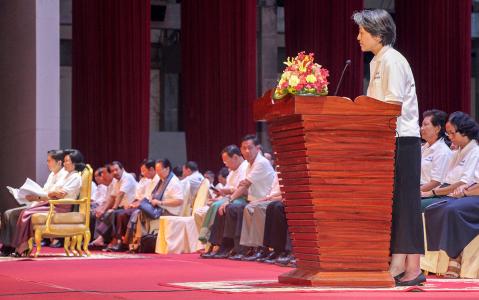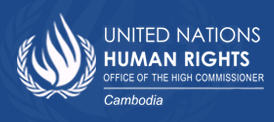2295

Statement by Wan-Hea Lee
Representative of the Office of the United Nations High Commissioner for Human Rights
at the Human Rights Day Celebration organized by
the Cambodian Human Rights Committee and the Phnom Penh Municipality
10 December 2015, Koh Pich.
My respect to the Deputy Prime Minister and Minister in charge of the Council of Ministers, His Excellency Sok An, the Deputy Director of the Cambodian Red Cross, Her Excellency Annie Sok An, the Governor of Phnom Penh, His Excellency Pa Socheatvong, and the President of the Cambodian Human Rights Committee, His Excellency Mak Sambath. Excellencies, ladies and gentlemen, It is my honour to be addressing you today. Human Rights Day provides us with an occasion once a year to remember that the concept of human rights is inherent to each and every one of us and cannot be taken away. As they belong to all of us, they also belong to all those around us. While the term “human rights” are often believed to be so intuitively clear that it needs no explanation, it often also evokes strong responses, both sympathetic ones that express remorse for those who suffer from violations or antipathetic ones that seem to believe that there is a political agenda behind human rights claims. This polarization of opinions about human rights is in a sense unavoidable, given that human rights touch upon the major issues of the day that, almost by definition, give rise to divergent views. The challenge is not how to eliminate such divisions but how to deal with them peacefully, in a way that respects human rights. Human Rights Day allows us a chance to consider this broader question with some much needed distance. I emphasize the need to overcome this “us” versus “them” mentality. If properly implemented, they protect all of us from abuses and guarantee our right to pursue our own fulfilment. The only limitations on your rights, as with the rights of anyone, are those that prevent you from infringing on the rights of others or are necessary for the nation to deal with national calamities. Civil servants have both rights and duties. They have the duty to abide by instructions they receive at work, which must never include instructions to infringe on the rights of others; they derive their ultimate instructions from the law itself, which must also respect human rights and which, by virtue of the Constitution, includes international human rights law. Human Rights Day provides an occasion every year to remember that. This year, the United Nations commemorates Human Rights Day with the launch of a campaign to celebrate the 50th dual anniversary of the International Covenants on Civil and Political Rights and on Economic, Social and Cultural Rights, which lay out the basic human rights of all persons. I encourage you to read these treaties - several times over - for understanding with precision what people are referring to when they demand their rights is the first step toward breaking down any barriers between “us” and “them”. On launching a year-long campaign to celebrate their 50th anniversary, my chief, the United Nations High Commissioner for Human Rights, Zeid Ra’ad Al Hussein, invited everyone to reflect on the meaning of freedom. As set out in these two landmark treaties and explained by the High Commissioner, it encompasses freedom from fear, freedom from want, freedom of speech and freedom of thought, conscience and religion. Each one of our freedoms are set out in simple terms in the treaties and explained in depth by the expert bodies that monitor their implementation in States parties with concrete recommendations for better implementation. The role of my own office, based in-country, is to help both the government and the people to fulfil these rights. You may have heard of my office in the news and at various events – I would hope so, since we have been operating in Cambodia for over 20 years. The Office of the High Commissioner for Human Rights was established in 1993; our global Headquarters and our Cambodia office were created nearly concurrently. Here in Cambodia, we were born out of the Paris Peace Accords, at a time when it was felt that human rights protection was central for the recovery of the nation, and indeed, that disregard for human rights was believed to be at the origins of the tragedy from which the nation was emerging. Those that feel strongest about human rights are often those who have experienced what it is to have them violated. We therefore have a strong connection with the most vulnerable in society in every country in which we operate. At the same time, as an inter-governmental institution, we work with governments. Human rights obligations refer to obligations of the State to respond to the claims of the people. To address these claims, we therefore turn to the State at all levels and work with it both on individual cases, as well as at the level of the systems, procedures, orders, laws and institutions that could correct the situation that gave rise to those claims to begin with. I take the occasion to renew our pledge of cooperation with the people and government of Cambodia, which I hope to see grow even stronger in the future. That cooperation must be based open dialogue and a sincere exchange of views. The dialogue should be nourished with a proper understanding of the applicable laws and standards. A considerable part of our work involves the delivery of training and organization of discussion forums for a number of State institutions. We submit legal analyses from a human rights perspective to Parliament to inform their work, and are ready to share our analyses at earlier stages in the drafting process. We reflect the careful balance that is built in human rights law between the obligations for maximum freedom and the special considerations to be applied should restrictions be necessary. While human rights law recognizes that emergencies can happen that require certain restrictive actions, but requires that these should be explained in the same spirit of open dialogue and those restrictions must also meet the threshold of human rights law. In other words, the permissible restrictions are not without limit and must be justified. This very morning, we see another situation that illustrates the balance that must be struck and the important decisions that must be taken by local officials. When called on to control demonstrations, there is no debate around the fact that they must be peaceful. At the same time, the fact that people have a right to demonstrate is also beyond dispute, even if that means that there will be inconveniences. The possibility of traffic congestion will simply need to be managed. Groups of persons departing from several sites in the city have begun marches to their destinations. I am informed that some are allowed to proceed unimpeded, that the traffic police are in fact facilitating their marches. To maintain public order is the duty of the State. The legal requirement to provide prior notification was enacted precisely for that purpose – to enable the authorities to facilitate public assemblies. Over these past few days, we have seen good examples of this working as intended, but also the opposite. This underscores my belief that public servants are among the most important human rights defenders; without them, no rights could be fulfilled. Another example of how public officials and the wider community can work together to protect human rights is with regard to persons in street situations. This term refers to persons who live, work, or otherwise depend on the streets. This growing problem has been dealt with through round-ups, when what they need is help. I am very pleased to announce that, next week, this will be the focus of a national conference, drawing from national and international expertise. The Phnom Penh municipality and the Ministry of Social Affairs, Veterans and Youth Rehabilitation, with the support of several United Nations agencies, will explore alternative ways to deal with such persons. I can guarantee that as Phnom Penh continues to grow, the number of street people will only grow with it. Providing for shelters, medical assistance, implementation of the welcome new National Housing Policy, are all parts of the sustainable solution needed. We are honoured to partner with the authorities to hopefully arrive at solutions that are right for these and all Phnom Penh residents. In anticipation of those solutions, local officials can help by dealing with persons in street situations with sensitivity and guiding them to any support facilities available. As Phnom Penh continues to grow, the availability of support facilities should grow with it, because the growth of vulnerable persons in need of them will also grow. It is almost mathematically predictable. Excellencies, ladies and gentlemen, Today is a day to cherish our freedoms. They were hard won through too many genocidal wars of the last century to become what they have now become: truly universal human values. They are the rights of all Cambodians, and they are the key to the four Buddhist blessings, which I wish for each of you in abundance. I thank you for your attention. [The conference took place on 15-16 December 2015. Please find here the recommendation adopted by all participants in
Khmer and
English]

